- Clone
- 20/70 (See other available formats)
- Regulatory Status
- RUO
- Other Names
- C5a ligand, C5a anaphylatoxin receptor, C5AR, C5R1, C5AR1
- Isotype
- Rat IgG2b, κ
- Ave. Rating
- Submit a Review
- Product Citations
- 3 publications
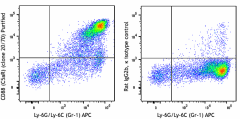
| Cat # | Size | Price | Save |
|---|---|---|---|
| 135815 | 100 µg | ¥44,820 | |
| 135816 | 1 mg | ¥112,390 |
CD88 is a single chain protein with seven membrane-spanning regions and a molecular weight of 43 kD. CD88 is expressed by neutrophils, eosinophils, and monocytes. There have been reports of CD88 expression in non-immune cells such as glial cells, cerebellar granule cells, cardiomyocytes, and vascular endothelial cells. CD88 is coupled to heterotrimeric G proteins such as Gi, and after C5a binding, the signal transduced by CD88 results in the activation of PLCβ, PI-3 kinase, and PLA2, among other molecules, resulting in chemotaxis, granule enzyme release, and superoxide anion production.
Product DetailsProduct Details
- Verified Reactivity
- Mouse
- Antibody Type
- Monoclonal
- Host Species
- Rat
- Immunogen
- mC5aR transfected cells
- Formulation
- 0.2 µm filtered in phosphate-buffered solution, pH 7.2, containing no preservative.
- Endotoxin Level
- Less than 0.01 EU/µg of the protein (< 0.001 ng/µg of the protein) as determined by the LAL test.
- Preparation
- The Ultra-LEAF™ (Low Endotoxin, Azide-Free) antibody was purified by affinity chromatography.
- Concentration
- The antibody is bottled at the concentration indicated on the vial, typically between 2 mg/mL and 3 mg/mL. Older lots may have also been bottled at 1 mg/mL. To obtain lot-specific concentration and expiration, please enter the lot number in our Certificate of Analysis online tool.
- Storage & Handling
- The antibody solution should be stored undiluted between 2°C and 8°C. This Ultra-LEAF™ solution contains no preservative; handle under aseptic conditions.
- Application
-
FC - Quality tested
Block - Reported in the literature, not verified in house - Recommended Usage
-
Each lot of this antibody is quality control tested by immunofluorescent staining with flow cytometric analysis. For flow cytometric staining, the suggested use of this reagent is ≤ 0.25 µg per million cells in 100 µL volume. It is recommended that the reagent be titrated for optimal performance for each application.
- Application Notes
-
Additional reported applications for the relevant formats include: blocking of C5a binding.
-
Application References
(PubMed link indicates BioLegend citation) -
- Godau J, et al. 2004. J. Immunol. 173:3437.
- Shushakova N, et al. 2002. J. Clin. Invest. 110:1823.
- Kim SH, et al. 2013. Int Immunol. 25:623. PubMed
- Product Citations
-
- RRID
-
AB_2819875 (BioLegend Cat. No. 135815)
AB_2819876 (BioLegend Cat. No. 135816)
Antigen Details
- Structure
- Single chain protein with seven membrane-spanning regions, 43 kD.
- Distribution
-
Neutrophils, eosinophils, monocytes, glial cells, cerebellar granule cells, cardiomyocytes, and vascular endothelial cells.
- Function
- After C5a binding, the CD88 signal results in chemotaxis, granule enzyme release and superoxide anion production.
- Interaction
- CD88 is coupled to heterotrimeric G proteins such as Gi, The signal transduced by CD88 results in the activation of PLCβ, PI-3 kinase, and PLA2, among other molecules.
- Bioactivity
- Chemotaxis, degranulation.
- Cell Type
- Dendritic cells, Endothelial cells, Eosinophils, Monocytes, Neutrophils
- Biology Area
- Cell Biology, Cell Motility/Cytoskeleton/Structure, Immunology, Innate Immunity, Neuroinflammation, Neuroscience
- Molecular Family
- CD Molecules
- Antigen References
-
1. Schraufstatter IU, et al. 2009. J. Immunol. 182:3827.
2. Ippel JH, et al. 2009. J. Biol. Chem. 284:12363.
3. Monk PN, et al. 2007. Br. J. Pharmacol. 152:429.
4. Griffin RS, et al. 2007. J. Neurosci. 27:8699.
5. Lee H, et al. 2006. Nat. Biotechnol. 24:1279.
6. Buck E and Wells JA, et al. 2005. P. Natl. Acad. Sci. USA 102:2719. - Gene ID
- 12273 View all products for this Gene ID
- UniProt
- View information about CD88 on UniProt.org
Related FAQs
- Do you guarantee that your antibodies are totally pathogen free?
-
BioLegend does not test for pathogens in-house aside from the GoInVivo™ product line. However, upon request, this can be tested on a custom basis with an outside, independent laboratory.
- Does BioLegend test each Ultra-LEAF™ antibody by functional assay?
-
No, BioLegend does not test Ultra-LEAF™ antibodies by functional assays unless otherwise indicated. Due to the possible complexities and variations of uses of biofunctional antibodies in different assays and because of the large product portfolio, BioLegend does not currently perform functional assays as a routine QC for the antibodies. However, we do provide references in which the antibodies were used for functional assays and we do perform QC to verify the specificity and quality of the antibody based on our strict specification criteria.
- Does BioLegend test each Ultra-LEAF™ antibody for potential pathogens?
-
No, BioLegend does not test for pathogens in-house unless otherwise indicated. However, we can recommend an outside vendor to perform this testing as needed.
- Have you tested this Ultra-LEAF™ antibody for in vivo or in vitro applications?
-
We don't test our antibodies for in vivo or in vitro applications unless otherwise indicated. Depending on the product, the TDS may describe literature supporting usage of a particular product for bioassay. It may be best to further consult the literature to find clone specific information.
Other Formats
View All CD88 Reagents Request Custom Conjugation| Description | Clone | Applications |
|---|---|---|
| PE anti-mouse CD88 (C5aR) | 20/70 | FC |
| Purified anti-mouse CD88 (C5aR) | 20/70 | FC |
| LEAF™ Purified anti-mouse CD88 (C5aR) | 20/70 | FC, Block |
| Biotin anti-mouse CD88 (C5aR) | 20/70 | FC |
| APC anti-mouse CD88 (C5aR) | 20/70 | FC |
| PE/Cyanine7 anti-mouse CD88 (C5aR) | 20/70 | FC |
| PerCP/Cyanine5.5 anti-mouse CD88 (C5aR) | 20/70 | FC |
| Ultra-LEAF™ Purified anti-mouse CD88 (C5aR) | 20/70 | FC,Block |
| TotalSeq™-A1042 anti-mouse CD88 (C5aR) | 20/70 | PG |
| TotalSeq™-C1042 anti-mouse CD88 (C5aR) Antibody | 20/70 | PG |
| TotalSeq™-B1042 anti-mouse CD88 (C5aR) | 20/70 | PG |
Customers Also Purchased
Compare Data Across All Formats
This data display is provided for general comparisons between formats.
Your actual data may vary due to variations in samples, target cells, instruments and their settings, staining conditions, and other factors.
If you need assistance with selecting the best format contact our expert technical support team.
-
PE anti-mouse CD88 (C5aR)
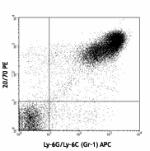
C57BL/6 bone marrow cells stained with 20/70 PE and Ly-6G/Ly... -
Purified anti-mouse CD88 (C5aR)

C57BL/6 mouse bone marrow granulocytes stained with Ly-6G/Ly... -
LEAF™ Purified anti-mouse CD88 (C5aR)
-
Biotin anti-mouse CD88 (C5aR)
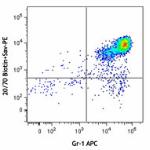
C57BL/6 mouse bone marrow cells were stained with Gr-1 APC a... 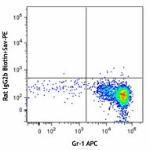
-
APC anti-mouse CD88 (C5aR)
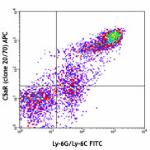
C57BL/6 mouse bone marrow cells were stained with Ly-6G/Ly-6... 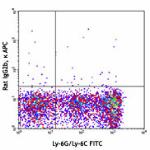
-
PE/Cyanine7 anti-mouse CD88 (C5aR)

C57BL/6 mouse bone marrow cells were stained with anti-mouse... -
PerCP/Cyanine5.5 anti-mouse CD88 (C5aR)

C57BL/6 mouse bone marrow cells were stained with Ly-6G/Ly-6... -
Ultra-LEAF™ Purified anti-mouse CD88 (C5aR)

C57BL/6 mouse bone marrow granulocytes stained with Ly-6G/Ly... -
TotalSeq™-A1042 anti-mouse CD88 (C5aR)
-
TotalSeq™-C1042 anti-mouse CD88 (C5aR) Antibody
-
TotalSeq™-B1042 anti-mouse CD88 (C5aR)









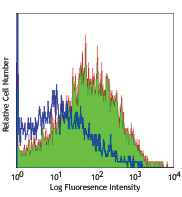



Follow Us